Stress has become one of the most pervasive health issues of the modern era. According to the American Psychological Association, chronic stress can contribute to serious health conditions such as heart disease, high blood pressure, diabetes, and depression. In today’s fast-paced, always-connected world, it’s easy to feel overwhelmed by work demands, financial pressures, family obligations, and social media. However, managing stress doesn’t necessarily require dramatic life changes or expensive treatments. In many cases, simple, evidence-based techniques can help reduce stress levels significantly—often within minutes. This article offers 10 science-backed methods you can apply today to feel more grounded, calm, and in control of your life.
1. Practice Diaphragmatic Breathing
Diaphragmatic breathing, also known as abdominal or belly breathing, is a technique that involves engaging the diaphragm fully while inhaling. This method stimulates the vagus nerve, which helps regulate the parasympathetic nervous system—the part of your nervous system responsible for rest and relaxation.
A study published in Frontiers in Psychology (2017) found that participants who practiced diaphragmatic breathing for 20 minutes twice daily experienced significant reductions in cortisol levels and reported improved mood and focus.
How to Practice Diaphragmatic Breathing:
- Sit or lie down in a quiet place.
- Place one hand on your chest and one on your abdomen.
- Inhale slowly through your nose for 4 seconds, letting your belly rise.
- Hold the breath for 2 seconds.
- Exhale gently through your mouth for 6 seconds, feeling your belly fall.
- Repeat for 5–10 minutes, focusing on each breath.
Even a few minutes a day of this practice can dramatically reduce stress and help calm racing thoughts.
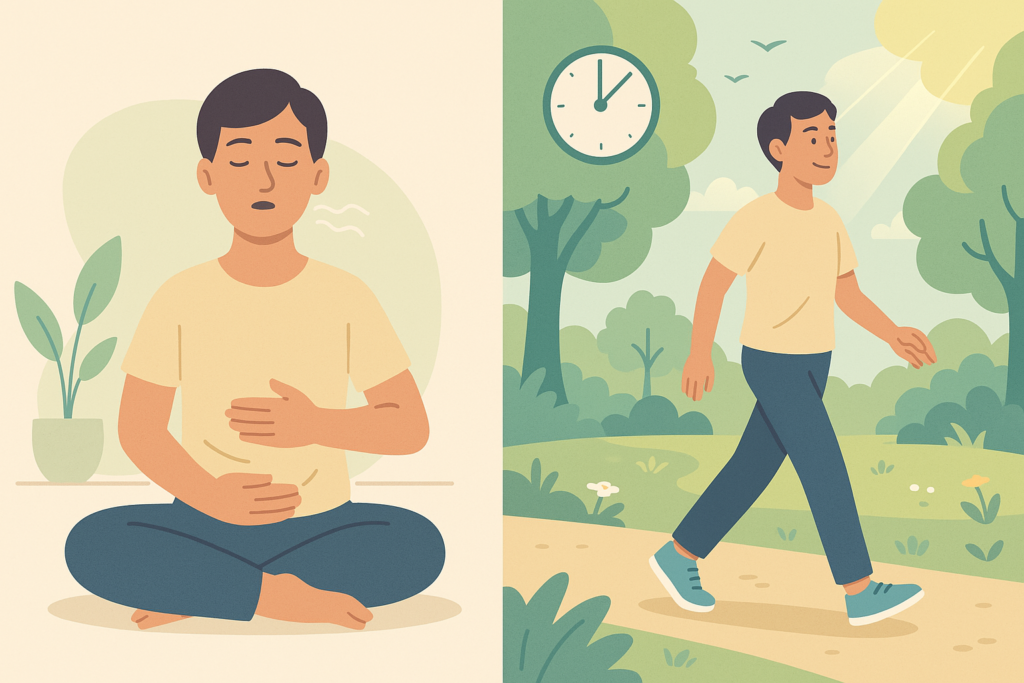
2. Take a 10-Minute Walk in Nature
Spending time in nature—even just for a short walk—can significantly lower stress levels. A 2019 study published in Frontiers in Psychology found that as little as 10 minutes in a natural environment (such as a park or green space) can lead to measurable reductions in cortisol, the body’s primary stress hormone.
Walking in nature promotes mindfulness by engaging your senses—sight, sound, and smell—and helps shift your focus away from internal worries. Additionally, exposure to sunlight naturally increases serotonin levels, which boosts mood and promotes calm.
Tips for Maximum Effect:
- Leave your phone behind or put it on silent.
- Focus on your surroundings—notice the color of the trees, the sound of birds, the feel of the breeze.
- Breathe deeply and walk slowly to let your body relax fully.
You don’t need a forest to experience the benefits—any nearby park, garden, or even a quiet street with greenery can be enough.
3. Use Progressive Muscle Relaxation
Progressive Muscle Relaxation (PMR) is a technique developed by Dr. Edmund Jacobson in the 1930s. It involves systematically tensing and then relaxing each muscle group in your body to promote deep physical relaxation and reduce psychological stress.
According to research from the Journal of Clinical Psychology, PMR is especially effective in decreasing anxiety, stress-related insomnia, and even certain types of chronic pain.
How to Do Progressive Muscle Relaxation:
- Find a quiet place and sit or lie down comfortably.
- Start from your feet and work your way up (or vice versa).
- Tense each muscle group (e.g., toes, calves, thighs, abdomen) for 5–10 seconds.
- Release the tension and focus on the sensation of relaxation for 15–20 seconds.
- Move on to the next group until you’ve covered your entire body.
This method helps bring awareness to muscle tension you might not even notice, and the act of intentionally releasing that tension can provide immediate relief from stress.
4. Try the 5-4-3-2-1 Grounding Technique
The 5-4-3-2-1 grounding technique is a simple yet powerful mindfulness exercise used to reduce anxiety and acute stress. It helps bring your attention back to the present moment by focusing on your five senses. Therapists often recommend this method during moments of panic or overwhelming stress.
This technique is based on sensory awareness, which interrupts racing thoughts and redirects your mental energy to what’s immediately around you.
How to Use the 5-4-3-2-1 Technique:
- 5 – Look around and name five things you can see.
- 4 – Acknowledge four things you can feel (e.g., the texture of your clothes, the chair you’re sitting on).
- 3 – Listen and identify three things you can hear (e.g., birds, a clock ticking).
- 2 – Notice two things you can smell (or recall smells if nothing is obvious).
- 1 – Name one thing you can taste (or remember a recent taste).
This sensory checklist helps ground you in the moment and provides rapid relief from stress, especially when your mind feels overwhelmed.
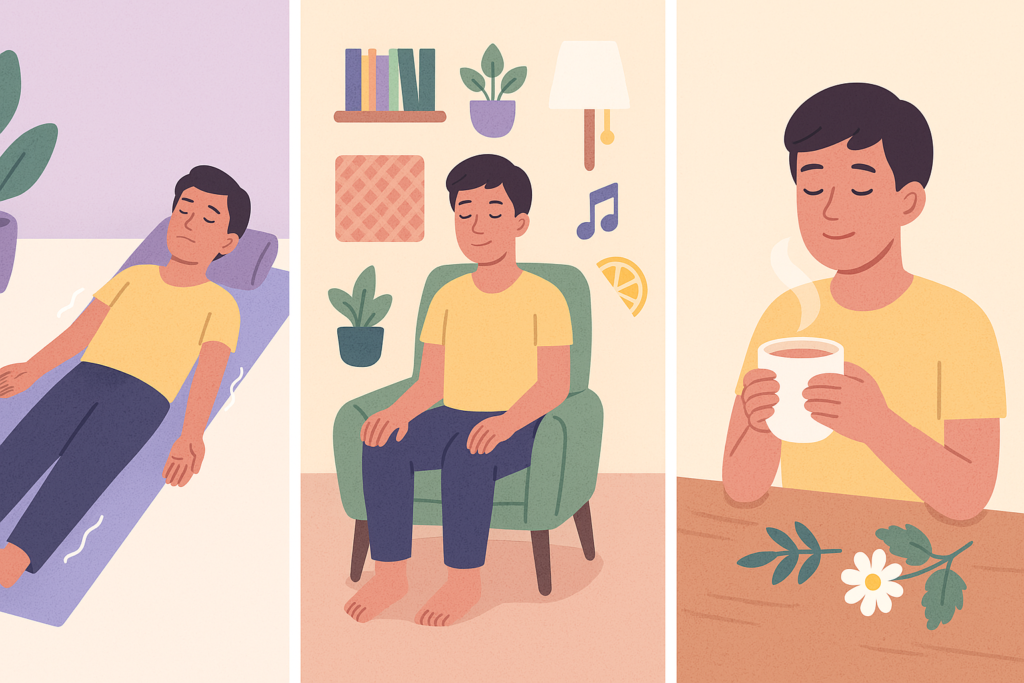
5. Sip a Cup of Herbal Tea
Drinking a warm cup of herbal tea isn’t just comforting—it can have real physiological effects on the body that reduce stress. Herbs like chamomile, lemon balm, lavender, and valerian root have been used for centuries to calm the nervous system and promote relaxation.
A 2016 review published in Phytomedicine confirmed that chamomile extract had mild sedative effects and helped reduce symptoms of generalized anxiety disorder. Similarly, lemon balm has been shown to reduce cortisol levels and improve mood.
Best Herbal Teas for Stress Relief:
- Chamomile – Calms nerves, helps with sleep.
- Lemon Balm – Reduces anxiety and promotes calmness.
- Lavender – Eases tension and improves mood.
- Valerian Root – Supports better sleep and relaxation (best taken at night).
- Peppermint – Soothes digestion, which can be affected by stress.
For best results, steep the tea for 5–10 minutes, breathe in the aroma deeply, and sip slowly while seated in a relaxed environment.
6. Practice Deep Breathing
Deep breathing exercises are among the simplest and most effective ways to reduce stress in the moment. By focusing on your breath and slowing it down, you activate the parasympathetic nervous system, which is responsible for calming the body and mind.
One well-known deep breathing technique is diaphragmatic breathing, also known as abdominal or belly breathing. Studies have shown that deep, slow breaths can help lower heart rate and blood pressure, both of which are elevated during stressful situations.
How to Practice Deep Breathing:
- Sit or lie down in a comfortable position.
- Place one hand on your chest and the other on your abdomen.
- Take a deep breath in through your nose, expanding your abdomen (not your chest) as you inhale.
- Slowly exhale through your mouth, feeling your abdomen fall.
- Repeat this process for 5–10 minutes.
The key is to breathe deeply and slowly, filling your lungs completely on the inhale and releasing the air slowly on the exhale. This exercise can be done anytime you feel stressed or anxious.
7. Engage in Physical Exercise
Exercise is one of the most effective and scientifically backed ways to combat stress. Physical activity promotes the release of endorphins, the body’s natural mood enhancers, which help improve feelings of well-being and reduce stress. Exercise also reduces the production of stress hormones like cortisol.
Regular physical activity has been shown to improve mental clarity, reduce anxiety, and enhance overall resilience to stress. Whether it’s a brisk walk, a run, yoga, or strength training, any form of movement can help alleviate tension and improve your mood.
Best Types of Exercise for Stress Relief:
- Aerobic Exercise (e.g., running, cycling, swimming) – Stimulates endorphin release and boosts mood.
- Yoga and Tai Chi – Combines deep breathing with gentle movements to calm the mind and body.
- Strength Training – Increases strength while improving mental resilience.
- Walking or Hiking – Simple and effective; spending time outdoors can also enhance mood.
Aim for at least 30 minutes of moderate physical activity most days of the week for the best stress-reducing effects.
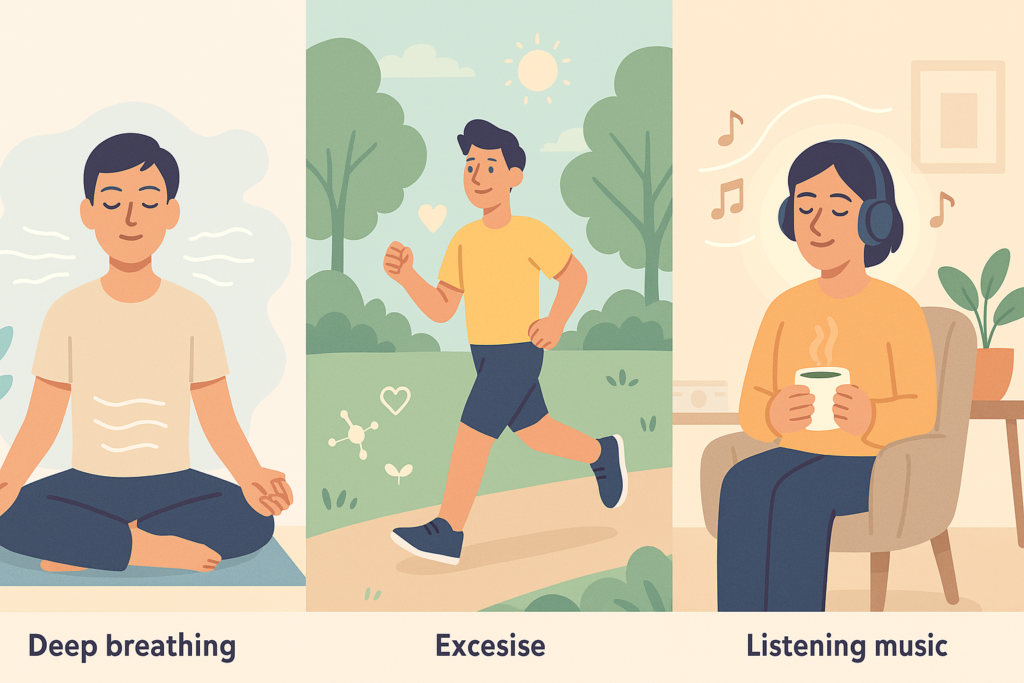
8. Listen to Music
Listening to music is a simple yet powerful way to reduce stress and boost mood. Research has shown that music can activate areas of the brain involved in emotion regulation, making it an effective tool for managing stress. Whether it’s calming classical music or your favorite upbeat songs, music can have a profound effect on both your emotional and physical state.
A 2013 study published in Psychology of Music found that listening to music can significantly reduce cortisol levels and enhance feelings of relaxation. Music also has the ability to distract your mind from stressors, helping you focus on something enjoyable.
How Music Reduces Stress:
- Reduces cortisol levels – Helps decrease stress hormones in the body.
- Promotes relaxation – Certain genres (e.g., classical, ambient) can slow heart rate and breathing, helping to calm the mind.
- Boosts mood – Upbeat and positive tunes can improve mood and promote feelings of happiness.
- Improves sleep – Listening to soothing music before bed can promote better sleep quality.
To use music effectively for stress relief, create a playlist of your favorite calming or uplifting tracks, and listen for at least 20 minutes when you feel stressed.
9. Practice Mindfulness Meditation
Mindfulness meditation is a practice rooted in Buddhist traditions that involves focusing on the present moment without judgment. It has gained immense popularity in the West due to its ability to reduce stress, enhance emotional regulation, and promote mental clarity. Mindfulness helps you become more aware of your thoughts and feelings, allowing you to process them without getting overwhelmed.
Research has shown that regular mindfulness practice can reduce cortisol levels, improve emotional well-being, and increase resilience to stress. Even just 10–15 minutes of mindfulness meditation per day can make a significant difference in how you manage stress.
How to Practice Mindfulness Meditation:
- Find a quiet place to sit comfortably.
- Close your eyes and take a few deep breaths to relax.
- Focus your attention on your breath, noticing the sensation of the air entering and leaving your body.
- If your mind starts to wander, gently bring your focus back to your breath without judgment.
- Continue for 10–15 minutes, allowing yourself to simply observe your thoughts.
Incorporating mindfulness into your daily routine can help you manage stress in a more mindful and balanced way.
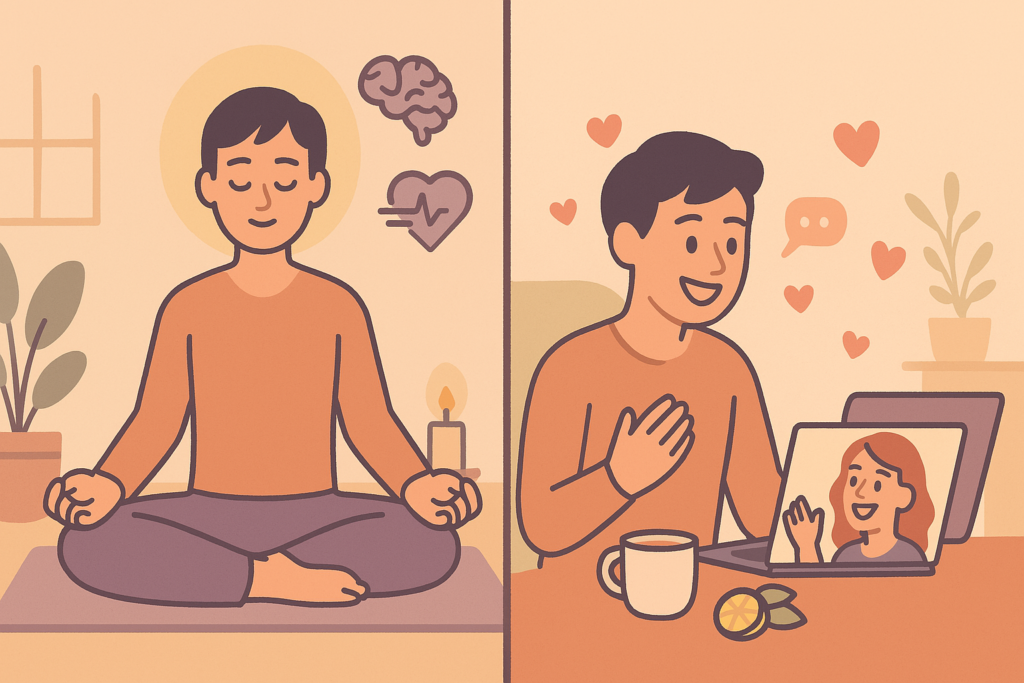
10. Stay Connected with Loved Ones
Social support is crucial for managing stress. Studies have shown that individuals with strong social connections are less likely to experience high levels of stress and are better able to cope with difficult situations. When you’re feeling overwhelmed, spending time with family, friends, or a support network can provide a sense of comfort and reduce feelings of isolation.
Interactions with loved ones can trigger the release of oxytocin, a hormone that helps reduce anxiety and promotes feelings of trust and bonding. This is why spending quality time with others can provide a significant emotional boost during stressful times.
Ways to Stay Connected:
- Regular phone or video calls – Even if you can’t meet in person, maintaining virtual connections is beneficial.
- Social gatherings – Join in on social events, either in person or virtually, to stay engaged and emotionally supported.
- Participate in group activities – Whether it’s a workout class, hobby group, or community event, being part of a group can combat stress.
If you don’t have many close relationships, consider volunteering or joining a social group where you can form new connections. Building and maintaining relationships is vital for long-term stress management.
Conclusion
Stress is an inevitable part of life, but managing it effectively can lead to improved mental and physical health. By incorporating simple strategies such as practicing deep breathing, engaging in physical exercise, listening to music, and maintaining strong social connections, you can significantly reduce stress and improve your well-being. Remember, small changes in your daily routine can have a profound impact on your overall health and happiness.
By practicing mindfulness, improving sleep quality, and embracing relaxation techniques, you’re giving yourself the tools to thrive in a world that often feels chaotic. The key is consistency. Make these techniques part of your regular self-care routine, and over time, you’ll notice a marked improvement in your stress levels and emotional resilience.
Take the first step today and begin integrating these strategies into your life. Your stress-free future begins now.
Main Takeaways
- Breathing Exercises: Deep breathing can trigger relaxation and reduce stress hormones like cortisol.
- Physical Exercise: Regular activity boosts mood and reduces stress by releasing endorphins.
- Music: Listening to calming or upbeat music can improve mood and lower cortisol levels.
- Mindfulness Meditation: Practicing mindfulness increases emotional resilience and helps manage stress.
- Quality Sleep: Adequate sleep is crucial for stress management and overall well-being.
- Relaxation Techniques: Techniques like progressive muscle relaxation help calm the body and mind.
- Social Support: Staying connected with loved ones provides emotional support and releases oxytocin, reducing anxiety.

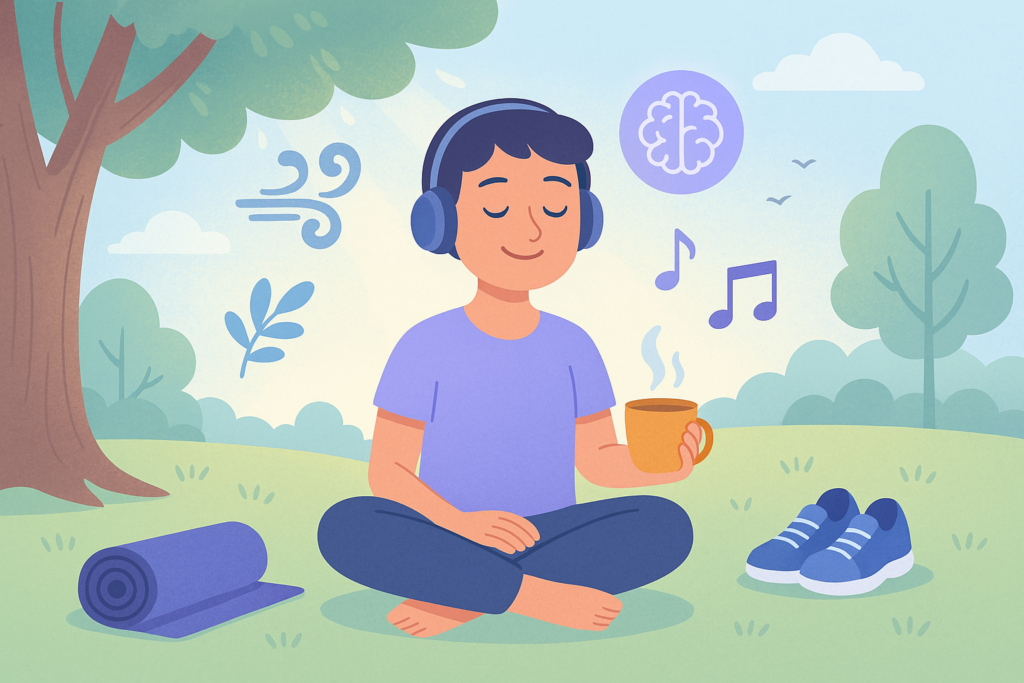


Pingback: How to Live a Healthy Lifestyle Without Drastic Changes—Here’s Proof It Works